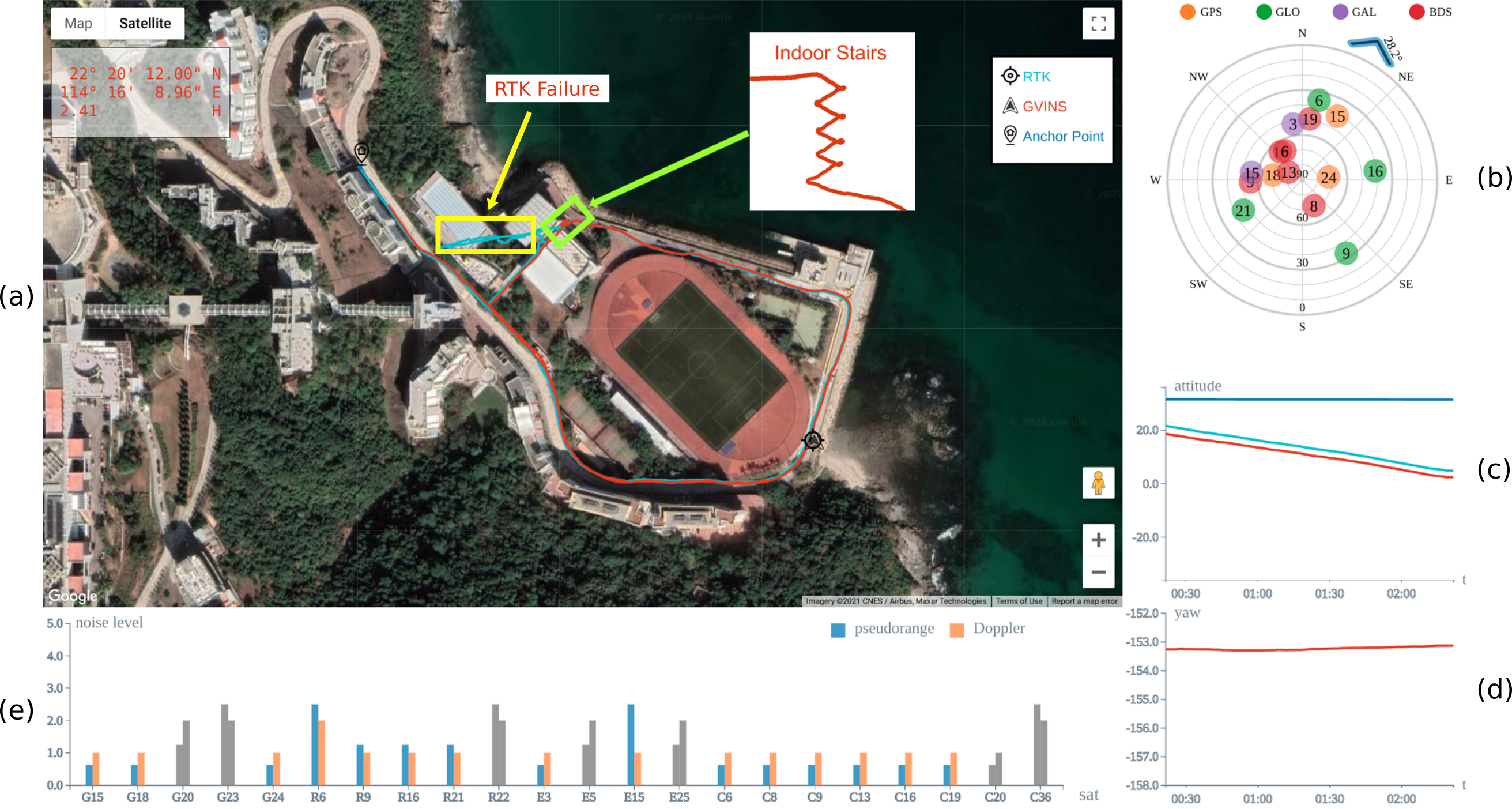GVINS: Tightly Coupled GNSS-Visual-Inertial Fusion for Smooth and Consistent State Estimation. paper link
Authors: Shaozu CAO, Xiuyuan LU and Shaojie SHEN
GVINS is a non-linear optimization based system that tightly fuses GNSS raw measurements with visual and inertial information for real-time and drift-free state estimation. By incorporating GNSS pseudorange and Doppler shift measurements, GVINS is capable to provide smooth and consistent 6-DoF global localization in complex environment. The system framework and VIO part are adapted from VINS-Mono. Our system contains the following features:
- global 6-DoF estimation in ECEF frame;
- multi-constellation support (GPS, GLONASS, Galileo, BeiDou);
- online local-ENU frame alignment;
- global pose recovery in GNSS-unfriendly or even GNSS-denied area.
Video:
This package requires some features of C++11.
This package is developed under ROS Kinetic environment.
Our code uses Eigen 3.3.3 for matrix manipulation.
We use ceres 1.12.0 to solve the non-linear optimization problem.
This package also requires gnss_comm for ROS message definitions and some utility functions. Follow those instructions to build the gnss_comm package.
Clone the repository to your catkin workspace (for example ~/catkin_ws/):
cd ~/catkin_ws/src/
git clone https://github.com/HKUST-Aerial-Robotics/GVINS.git
Then build the package with:
cd ~/catkin_ws/
catkin_make
source ~/catkin_ws/devel/setup.bash
If you encounter any problem during the building of GVINS, we recommend you to try docker first.
To simplify the building process, we add docker in our code. Docker is like a sandbox so it can isolate our code from your local environment. To run with docker, first make sure ros and docker are installed on your machine. Then add your account to docker group by sudo usermod -aG docker $USER. Logout and re-login to avoid the Permission denied error, then type:
cd ~/catkin_ws/src/GVINS/docker
make build
The docker image gvins:latest should be successfully built after a while. Then you can run GVINS with:
./run.sh LAUNCH_FILE
(for example ./run.sh visensor_f9p.launch). Open another terminal and play your rosbag file, then you should be able to see the result. If you modify the code, simply re-run ./run.sh LAUNCH_FILE to update.
Download our GVINS-Dataset and launch GVINS via:
roslaunch gvins visensor_f9p.launch
Open another terminal and launch the rviz by:
rviz -d ~/catkin_ws/src/GVINS/config/gvins_rviz_config.rviz
Then play the bag:
rosbag play sports_field.bag
- Setup the visual-inertial sensor suit according to these instructions;
- Configure your GNSS receiver to output raw measurement and ephemeris and convert them as ros messages. If you are using u-blox receiver, please checkout our ublox_driver package;
- Deal with the synchronization between visual-inertial sensor and GNSS receiver. A coarse synchronization can be done via ublox_driver but the accuracy is not guaranteed. For better performance, we recommend hardware synchronization via receiver's PPS signal;
- Change the topic name in the config file and create a launch file pointing to the corresponding config file. Launch the GVINS with
roslaunch gvins YOUR_LAUNCH_FILE.launch.
The system framework and VIO part are adapted from VINS-Mono. We use camodocal for camera modelling and ceres to solve the optimization problem.
The source code is released under GPLv3 license.

